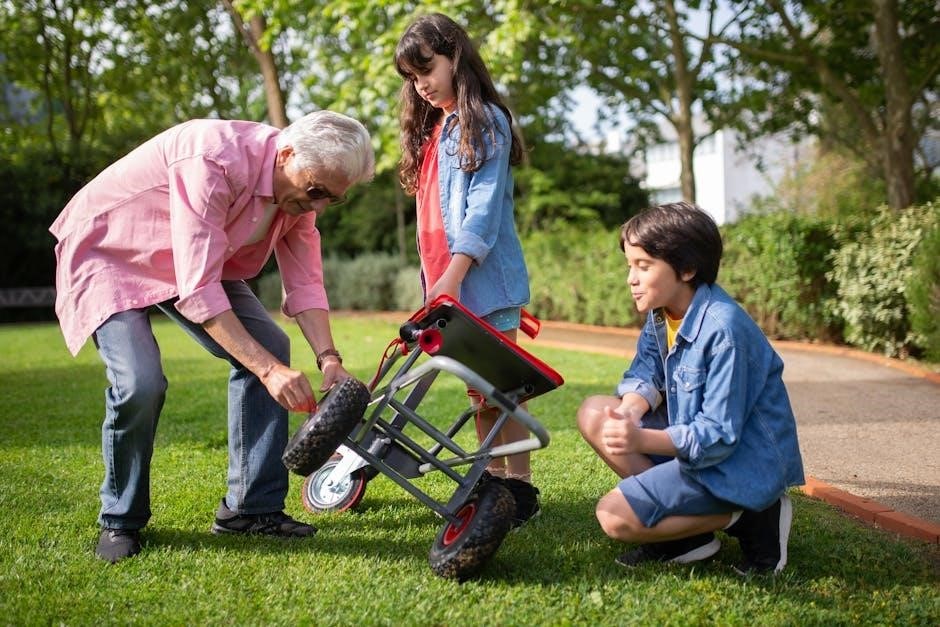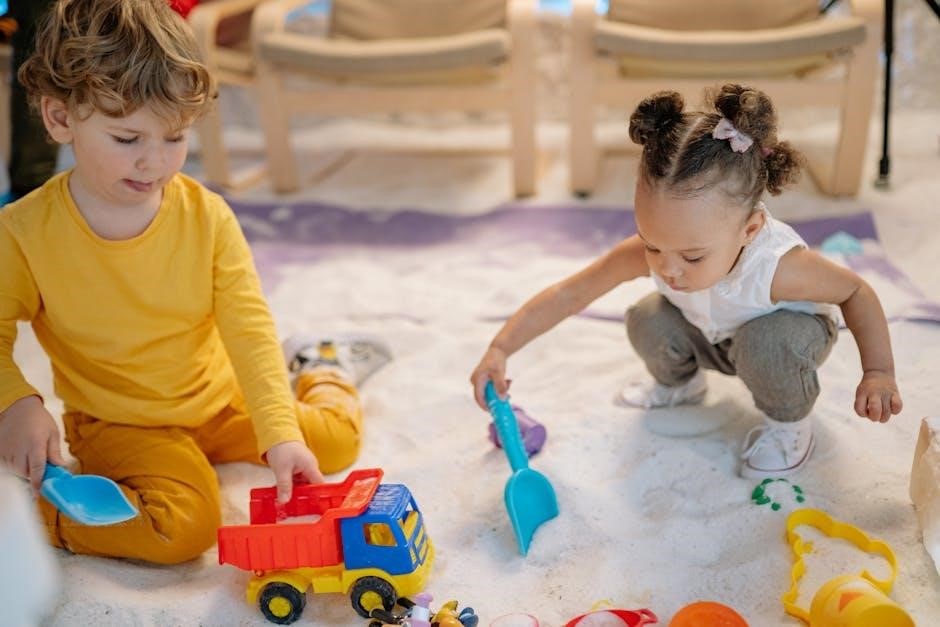
learning activities for 4-5 year olds pdf
Learning activities for 4-5 year olds promote cognitive‚ social‚ and emotional growth through play-based experiences․ These activities‚ often available as free PDF worksheets‚ focus on developing essential skills like literacy‚ numeracy‚ and creativity‚ ensuring a strong foundation for future learning․
Importance of Play-Based Learning for Preschoolers
Importance of Play-Based Learning for Preschoolers
Play-based learning is essential for preschoolers‚ fostering creativity‚ problem-solving‚ and independence․ It encourages hands-on exploration‚ promoting cognitive‚ social‚ and emotional growth․ Through play‚ children develop critical thinking‚ cooperation‚ and self-confidence․ Activities like puzzles‚ art‚ and imaginative games enhance fine motor skills and hand-eye coordination․ Play-based learning also supports language development and numeracy skills‚ laying a strong foundation for future academic success; By integrating fun and engaging experiences‚ preschoolers build a lifelong love for learning in a natural‚ enjoyable way․
Benefits of Using PDF Worksheets for Young Learners
Benefits of Using PDF Worksheets for Young Learners
PDF worksheets offer a convenient and accessible way to support young learners’ development․ They are often free‚ easily downloadable‚ and printable‚ making them a practical resource for parents and educators․ These worksheets provide structured activities that cater to different learning paces‚ promoting independence and self-directed learning․ They also support fine motor skills through tracing‚ coloring‚ and cutting tasks․ Additionally‚ PDF worksheets can be laminated for reuse‚ making them a durable and eco-friendly option․ Their versatility allows them to cover a wide range of subjects‚ from math and reading to creativity and problem-solving‚ ensuring well-rounded development․
Literacy Development Activities
Literacy development activities for 4-5 year olds include alphabet tracing‚ phonological awareness games‚ and word recognition exercises․ These exercises build foundational reading skills through engaging and interactive PDF worksheets․
Alphabet Tracing Worksheets
Alphabet tracing worksheets are a foundational tool for teaching 4-5 year olds letter recognition and handwriting skills․ These worksheets‚ available as free PDF downloads‚ feature uppercase and lowercase letters‚ allowing children to practice tracing and forming letters accurately․ They help develop fine motor skills and hand-eye coordination while introducing the basics of literacy․ Tracing activities make learning engaging and fun‚ with colorful designs and simple instructions․ Parents and educators can use these worksheets to reinforce alphabet knowledge and prepare young learners for reading and writing․ They are a great way to make learning enjoyable and effective at home or in the classroom․
Phonological Awareness Games
Phonological awareness games are essential for 4-5 year olds to develop early reading skills․ These activities‚ often included in free PDF worksheets‚ focus on identifying rhymes‚ syllables‚ and beginning sounds․ Games like “Spot the Rhyme” or “Sound Sorting” engage children in auditory learning‚ enhancing their ability to manipulate sounds․ Interactive exercises‚ such as matching games or word segmentation‚ make learning fun and interactive․ These games build a strong foundation for reading and spelling‚ helping children recognize patterns in language․ They are a playful and effective way to improve phonological awareness at home or in the classroom․
Word Recognition Exercises
Word recognition exercises are vital for 4-5 year olds to develop early literacy skills․ Free PDF worksheets often include activities like spotting uppercase letters‚ matching words to pictures‚ and tracing simple sight words․ These exercises help children identify patterns and sounds‚ building decoding skills․ Games like “Word Match” or “Find the Letter” make learning engaging․ Tracing and writing exercises improve fine motor skills while reinforcing word recognition․ These activities prepare children for reading by familiarizing them with common words and letter combinations‚ making the transition to independent reading smoother and more confidence-building․ They are both fun and educational for young learners․
Numeracy and Math Skills
Numeracy and math skills are introduced through fun‚ engaging activities like number tracing‚ basic addition‚ and shape recognition․ Free PDF worksheets help children grasp foundational math concepts‚ fostering problem-solving and logical thinking while building confidence in their abilities․ These exercises lay a strong foundation for future math learning‚ making early numeracy skills enjoyable and accessible for young learners․
Number Tracing Worksheets
Number tracing worksheets are a fantastic tool for developing early numeracy skills in 4-5 year olds․ These free PDF worksheets help children practice writing numbers‚ improving fine motor skills and handwriting․ They introduce basic number recognition and formation‚ making math fun and engaging․ With colorful designs and simple layouts‚ these worksheets are perfect for young learners․ Activities include tracing numbers with fingers or crayons‚ connecting dots to form numbers‚ and matching numbers to their quantities․ These exercises prepare children for more complex math concepts while building confidence in their ability to recognize and write numbers․ They are an excellent way to introduce foundational math skills in a playful and structured manner․
Basic Addition and Subtraction Concepts
Basic addition and subtraction concepts are introduced to 4-5 year olds through playful and interactive activities․ Free PDF worksheets often feature visual aids like counting blocks‚ fingers‚ or objects to help children understand these math basics․ These exercises use simple language and colorful illustrations to make learning engaging․ Activities include matching numbers‚ counting together‚ and solving basic equations‚ all designed to build foundational math skills․ Manipulatives and hands-on tasks also encourage problem-solving and critical thinking․ These resources prepare young learners for more complex math operations while fostering a love for numeracy and logical reasoning in a fun‚ accessible way․
Shape and Pattern Recognition
Shape and pattern recognition activities help 4-5 year olds develop foundational math skills․ Free PDF worksheets often include shape tracing‚ matching‚ and sorting exercises․ These activities encourage children to identify and create patterns using everyday objects or visuals‚ fostering critical thinking and problem-solving abilities․ Colorful illustrations and interactive designs make learning engaging․ Shape recognition builds spatial awareness‚ while pattern exercises enhance sequencing and logical reasoning․ These resources are designed to be fun and educational‚ laying a strong foundation for future math concepts and cognitive development in young learners․ They are easily accessible and printable for home or classroom use․

Creativity and Fine Motor Skills
Creativity and fine motor skills are nurtured through activities like coloring‚ drawing‚ and cut-and-paste worksheets․ These exercises enhance hand-eye coordination and artistic expression‚ preparing young learners for writing and crafting with tools like crayons and safety scissors․
Coloring and Drawing Activities
Coloring and drawing activities are essential for fostering creativity and fine motor skills in preschoolers․ These exercises allow children to explore colors‚ patterns‚ and shapes while refining their hand-eye coordination․ Free PDF worksheets often feature themed sheets‚ such as animals‚ seasons‚ or shapes‚ making learning engaging․ Coloring activities also introduce children to color theory and mixing‚ while drawing encourages self-expression and imagination․ Parents and educators can download these resources to provide structured yet fun experiences‚ helping children develop artistic skills and confidence․ These activities are ideal for young learners‚ blending creativity with foundational skill development․
Cut and Paste Worksheets
Cut and paste worksheets are engaging tools for enhancing fine motor skills and hand-eye coordination in young learners․ These activities involve sorting‚ matching‚ and arranging shapes‚ colors‚ or objects‚ fostering creativity and problem-solving abilities․ Many free PDF resources offer themed exercises‚ such as animal sorting or shape recognition‚ making learning fun and interactive․ Parents and educators can laminate these sheets for repeated use‚ often adding velcro dots for easy handling․ This tactile approach helps preschoolers develop dexterity and confidence‚ making it an essential part of their early learning journey․
Pre-Writing Practice Sheets
Pre-writing practice sheets are designed to help young learners develop the foundational skills needed for handwriting․ These worksheets often feature exercises like tracing lines‚ curves‚ and shapes‚ as well as drawing simple patterns․ They aim to improve fine motor skills‚ hand-eye coordination‚ and dexterity․ Many free PDF resources include themed pre-writing activities‚ such as tracing animals or vehicles‚ making the process engaging and fun․ By mastering these skills‚ children build confidence and prepare for writing letters and numbers․ These sheets are a crucial step in fostering creativity and readiness for more complex writing tasks in the future․
Social-Emotional Learning
Social-emotional learning fosters self-awareness‚ empathy‚ and interpersonal skills in young children․ Activities like emotion recognition and cooperation exercises help children manage emotions and build positive relationships․ These skills are vital for lifelong personal growth and effective communication․ Free PDF worksheets often include themed games and exercises to make learning engaging and fun for preschoolers․ By practicing these skills‚ children develop confidence and the ability to navigate social situations successfully․ These activities lay a strong foundation for emotional intelligence and problem-solving abilities․ They encourage kindness‚ sharing‚ and teamwork‚ essential for forming healthy relationships and achieving academic success․
Emotion Recognition Activities
Emotion recognition activities help preschoolers identify and understand different feelings like happiness‚ sadness‚ and anger․ Free PDF worksheets often feature facial expressions or scenarios for children to label emotions․ Matching games‚ coloring tasks‚ and storytelling exercises engage young learners‚ fostering empathy and self-awareness․ These activities encourage children to express their emotions healthily and develop emotional intelligence․ By practicing emotion recognition‚ kids improve their ability to navigate social interactions and build strong relationships․ Interactive worksheets make learning fun and accessible‚ while also reinforcing essential life skills for emotional well-being and communication․ These tools are invaluable for early childhood development․
Sharing and Cooperation Exercises
Sharing and cooperation exercises are essential for fostering social skills in preschoolers․ Activities like group games‚ turn-taking tasks‚ and collaborative puzzles encourage teamwork and empathy․ Free PDF worksheets often include scenarios where children can practice sharing and helping others․ These exercises help develop kindness‚ patience‚ and conflict resolution skills․ By engaging in cooperative play‚ young learners build strong relationships and understand the value of working together․ Such activities prepare children for kindergarten by teaching them to respect others’ feelings and contribute positively to a group setting‚ promoting a sense of community and responsibility․
Self-Confidence Building Tasks
Self-confidence building tasks empower preschoolers to believe in their abilities and express themselves freely․ Activities like praising achievements‚ encouraging independent problem-solving‚ and providing opportunities for creative expression foster a positive self-image․ Simple challenges‚ such as completing puzzles or drawing pictures‚ allow children to experience success and pride in their work․ These tasks help young learners develop resilience and a growth mindset‚ essential for overcoming challenges․ By celebrating their efforts and accomplishments‚ caregivers nurture confidence‚ enabling children to approach new experiences with enthusiasm and self-assurance․

Sensory Play and Exploration
Sensory play enhances creativity and exploration skills through hands-on activities like texture sorting‚ color matching‚ and sensory bin explorations․ These tasks stimulate curiosity and developmental growth․
Texture Sorting Worksheets
Texture sorting worksheets engage young learners in recognizing and categorizing different textures‚ enhancing sensory awareness and fine motor skills․ These activities encourage exploration of materials like rough‚ smooth‚ soft‚ or hard‚ fostering tactile discrimination․ By sorting textures‚ children develop problem-solving abilities and hand-eye coordination․ Worksheets often feature colorful images or objects‚ making learning interactive and enjoyable; This activity is crucial for sensory development and can be easily downloaded as free PDF resources‚ providing a convenient way to support early learning․
Color Matching Games
Color matching games are engaging activities that help preschoolers develop color recognition and sorting skills․ These games often feature vibrant visuals and interactive elements‚ encouraging children to identify and categorize colors accurately․ By matching objects or cards of the same color‚ kids enhance their problem-solving abilities and hand-eye coordination․ Such activities also foster creativity and attention to detail‚ making learning fun and interactive․ Many free PDF worksheets are available‚ offering colorful designs and varied difficulty levels to suit different learning needs․ These resources are ideal for reinforcing color awareness in young learners․
Sensory Bin Activity Guides
Sensory Bin Activity Guides
Sensory bin activity guides provide structured yet engaging experiences for preschoolers‚ encouraging exploration and tactile learning․ These guides often include themed materials like rice‚ beans‚ sand‚ or water‚ along with hidden objects for discovery․ Children develop sensory awareness‚ fine motor skills‚ and creativity while interacting with different textures and colors․ Many free PDF guides offer step-by-step instructions‚ making it easy for parents and educators to create immersive learning environments․ These activities foster curiosity and hands-on engagement‚ helping young learners connect with the world around them in a fun and meaningful way․
STEM Activities for Preschoolers
STEM activities introduce young learners to science‚ technology‚ engineering‚ and math through play․ Simple experiments‚ building blocks‚ and sorting games foster curiosity and problem-solving skills․
Simple Science Experiments
Simple science experiments for 4-5 year olds encourage curiosity and exploration․ Activities like mixing colors‚ growing plants‚ or creating homemade lava lamps introduce basic scientific concepts․ These experiments are designed to be safe‚ engaging‚ and easy to understand‚ fostering a love for STEM early on․ They often require household items‚ making them accessible for home or classroom use․ Supervised by adults‚ these hands-on activities help young learners develop observation skills and critical thinking while having fun discovering the world around them․
- Color mixing with food coloring and water․
- Baking soda and vinegar reactions for a mini “volcano․”
- Planting seeds to observe growth over time․
These experiments are perfect for sparking creativity and laying the groundwork for future STEM interests․
Building and Construction Play
Building and construction play is a fantastic way to encourage creativity and problem-solving in 4-5 year olds․ Using blocks‚ magnetic tiles‚ or LEGO DUPLO‚ children can create structures‚ bridges‚ or towers‚ developing their fine motor skills and hand-eye coordination․ These activities foster imagination and critical thinking while introducing basic engineering concepts․ PDF guides often include step-by-step ideas for themed builds‚ such as houses‚ vehicles‚ or animals‚ making it easy for parents and educators to support learning through play․
- Stacking blocks to create tall towers․
- Using magnetic tiles for 3D shapes․
- Building themed models like farms or cities․
These activities help children express their creativity and develop essential skills for future STEM learning․
Problem-Solving Puzzles
Problem-solving puzzles are an excellent way to enhance critical thinking and logical reasoning in 4-5 year olds․ Simple jigsaw puzzles‚ matching games‚ and pattern-completion activities challenge young minds to think creatively․ These exercises improve memory‚ concentration‚ and hand-eye coordination while fostering independence․ Free PDF resources often include themed puzzles‚ such as animal matching or shape sorting‚ making learning both fun and engaging․ Solving puzzles builds self-confidence and prepares children for more complex STEM concepts in the future․
- Matching shapes and colors․
- Completing simple jigsaw puzzles․
- Identifying patterns and sequences․
Puzzles are a great tool for developing problem-solving skills in a playful manner․
Outdoor and Physical Activities
Outdoor and physical activities‚ such as scavenger hunts‚ obstacle courses‚ and movement games‚ promote physical fitness‚ teamwork‚ and exploration while fostering coordination and social skills in young children․
Scavenger Hunts
Scavenger hunts are engaging outdoor activities that encourage exploration‚ teamwork‚ and problem-solving․ These interactive games involve searching for specific items‚ such as objects in nature or themed elements‚ which helps develop observation and critical thinking skills․ Scavenger hunts can be adapted to various themes‚ like alphabet or color recognition‚ making them both educational and fun․ They also promote physical movement and collaboration‚ fostering social interaction and excitement․ With riddles or picture clues‚ scavenger hunts provide a dynamic way to connect learning with outdoor adventures‚ making them a valuable addition to preschool learning activities․
Outdoor Obstacle Courses
Outdoor obstacle courses are dynamic physical activities that foster gross motor skills‚ coordination‚ and balance in young children․ These courses‚ often set up with simple materials like cones‚ ropes‚ or small hurdles‚ encourage active play and teamwork․ Kids navigate through challenges‚ developing problem-solving abilities and perseverance․ Obstacle courses can also incorporate themed elements‚ such as crawling under ropes or jumping over “rivers‚” making them engaging and imaginative․ They promote physical fitness‚ social interaction‚ and self-confidence while allowing children to explore and enjoy the outdoors․ Adaptability makes them suitable for various skill levels and group sizes․
Movement and Coordination Games
Movement and coordination games are essential for developing gross motor skills in preschoolers․ Activities like “Simon Says‚” “Red Light‚ Green Light‚” and simple dance routines encourage balance‚ rhythm‚ and physical control․ These games also enhance spatial awareness and creativity‚ as children mimic movements or create their own․ Incorporating props like balls or ribbons adds complexity‚ refining hand-eye coordination․ Such games foster social interaction‚ teamwork‚ and self-expression while being adaptable to various skill levels․ They provide a fun‚ engaging way for children to stay active‚ build confidence‚ and develop essential physical abilities in a playful‚ structured environment․

Free Printable Resources
Free printable resources for preschoolers include PDF worksheets‚ activity books‚ and educational materials․ These downloadable tools support learning in literacy‚ numeracy‚ and creativity‚ available for easy access․
Where to Find Free PDF Worksheets
Free PDF worksheets for 4-5 year olds can be found on educational websites like Kiddo Worksheets and Oh My Classroom․ These platforms offer a wide range of activities‚ including alphabet tracing‚ number recognition‚ and shape sorting․ Many worksheets are designed to be fun and engaging‚ supporting literacy‚ numeracy‚ and creativity․ They are printable and easily downloadable‚ making them ideal for homeschooling or classroom use․ These resources are regularly updated‚ ensuring a variety of learning materials for young children․
How to Download and Use Preschool Worksheets
To download preschool worksheets‚ visit educational websites like Kiddo Worksheets or Oh My Classroom․ Choose the desired activity‚ then click the download link to save the PDF․ Print the worksheets directly from your browser or save them for later use․ For durability‚ laminate the sheets and use velcro dots for interactive activities․ These worksheets are designed for independent learning‚ allowing children to practice skills like tracing‚ coloring‚ and problem-solving․ Regular use helps track progress and supports foundational learning in literacy‚ numeracy‚ and creativity․
Recommended Websites for Preschool Learning Materials
For high-quality preschool learning materials‚ visit websites like Kiddo Worksheets and Oh My Classroom․ These platforms offer free PDF worksheets designed for children aged 3-5‚ covering skills like alphabet tracing‚ number recognition‚ and shape sorting․ Additionally‚ 123 Homeschool 4 Me provides interactive and engaging activities․ These websites are user-friendly‚ allowing easy downloads and printing․ They also include tips for using materials effectively‚ such as laminating sheets for reuse and incorporating Velcro dots for interactive tasks․ These resources are perfect for caregivers and educators seeking structured yet fun learning experiences․
Assessment and Progress Tracking
PDF worksheets are valuable tools for assessing preschoolers’ skills and tracking their progress․ They help identify strengths‚ areas needing support‚ and guide personalized learning plans effectively․
Using Worksheets for Skill Assessment
Worksheets are invaluable for assessing preschoolers’ skills‚ offering clear tasks to evaluate their progress․ They provide insight into fine motor accuracy‚ letter recognition‚ and problem-solving abilities․ By observing completed worksheets‚ educators can identify learning gaps and strengths‚ tailoring instruction to individual needs․ These tools also promote independent learning‚ allowing children to demonstrate their understanding confidently․ Regular use of worksheets helps track developmental milestones‚ ensuring timely interventions and fostering a smooth transition to more advanced learning․ They are a practical way to monitor growth and readiness for kindergarten․
Tracking Developmental Milestones
Tracking developmental milestones in 4-5 year olds is essential for understanding their growth and readiness for future learning․ Worksheets and activities help monitor progress in literacy‚ numeracy‚ and social skills․ By observing improvements in tasks like alphabet tracing or shape recognition‚ parents and educators can identify achievements and areas needing support․ Regular assessment ensures children are developing foundational skills‚ such as hand-eye coordination and problem-solving․ These tools provide insights into cognitive and emotional growth‚ helping create tailored learning plans․ Consistent tracking supports a smooth transition to kindergarten and fosters confidence in young learners․
Adjusting Activities Based on Learning Needs
Adjusting learning activities for 4-5 year olds ensures each child’s unique needs are met․ Worksheets and games can be customized to suit different skill levels‚ fostering personalized growth․ For example‚ children mastering alphabet tracing can progress to word recognition‚ while others may need additional support․ Differentiated instruction allows educators to tailor activities‚ ensuring no child is left behind․ Free PDF worksheets offer flexibility‚ enabling adaptations for varying learning styles and developmental stages․ This approach supports diverse learning needs‚ promoting confidence and skill development in young learners․ Regular assessments help identify areas for adjustment‚ ensuring activities remain engaging and effective․